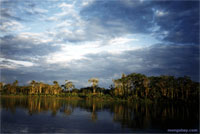 |
|
Frogs, fish and pharmaceuticals a troubling brew
Prozac, other drugs detected in streams and their inhabitants
By Marsha Walton
CNN
Friday, November 14, 2003 Posted: 9:14 AM EST (1414 GMT)
http://www.cnn.com/2003/TECH/science/11/14/coolsc.frogs.fish/index.html
(CNN) -- A number of aquatic and amphibian species are being exposed to small amounts of everything from Prozac to perfume to birth control pills that make their way into U.S. rivers and streams.
And scientists now have evidence that this "cocktail" of pharmaceuticals, in high enough quantities, can lead to problems that may be serious enough to prevent wildlife from reproducing. It's not yet clear how the buildup over time could affect the species.
In 2002, 80 percent of streams sampled by the U.S. Geological Survey showed evidence of drugs, hormones, steroids and personal care products such as soaps and perfumes. The U.S.G.S. tested 139 rivers in 30 states.
To give an idea how many drug remnants make their way into ponds, creeks and streams, after being passed through humans, sent into sewer systems and released from wastwater treatment plants:
More than 61 million prescriptions for anti-depressants were prescribed by U.S. doctors in 2001, according to the National Center for Health Statistics at the CDC. Because prescriptions like anti-depressants are for chronic conditions, patients often take them for months and years at a time, making them more likely to build up in wastewater
Researchers are working on several fronts to determine how big the problem is and just what short- and long-term ecological effects there might be on wildlife.
Bryan Brooks, a toxicologist at Baylor University in Texas, discovered evidence of Prozac, an anti-depressant, in the brains, livers, and muscles of bluegill, caught downstream from the Pecan Creek Water Reclamation Plant in Denton, Texas, near Dallas.
Unintended consequences
Anti-depressants have the same effect on fish that they do on people: they tend to relax them. That's not necessarily a good thing for the fish, though.
"We need to ask the question, 'what does accumulation in fish tissue actually mean to the organism's ability to live, grow, or reproduce?'" said Bryan Brooks, a Baylor University toxicologist.
While he and his colleagues discovered those medications in fish in the wild, scientists are now studying aquatic species in the lab, to see just how specific amounts of pills and potions affect them.
Marsha Black, an aquatic toxicologist at the University of Georgia in Athens, found that low levels of common anti-depressants, including Prozac, Zoloft, Paxil and Celexa, cause development problems in fish, and metamorphosis delays in frogs.
"In mosquitofish, markers of sexual maturity were delayed in both males and females," said Black. Metamorphosis in frogs was also delayed significantly, she said.
In the mosquitofish, sexual development in males was delayed by two to four weeks.
Timing is crucial
Black says that timing is crucial to the survival of many water creatures. For example, frog eggs are often laid in ponds and wetlands that are temporary. If tadpoles have not completed metamorphosis by the time the water disappears, they will die before reaching adulthood.
In the next phase of her study, funded by the Environmental Protection Agency, Black will look at the reproductive tissue of the fish affected by the anti-depressants.
Sewage treatment plants are not equipped to filter out any of the hundreds of different prescription drugs that are present in wastewater. And it's not clear just how they would approach the cost or technology of such a challenge.
Michael Smith is manager of the R. M. Clayton wastewater treatment plant in Atlanta, the largest such facility in the southeast. The facility treats about 80 million gallons of water each day.
"Trying to enhance this facility to remove those items would probably require some reverse osmosis or some kind of further ultra filtration system," said Smith. "It would require a lot more construction and a lot more cost to remove those items," he said.
CONTENT COPYRIGHT CNN. THIS CONTENT IS INTENDED SOLELY FOR EDUCATIONAL PURPOSES.
|
|
 A Place Out of Time:
A Place Out of Time:
Tropical Rainforests - Their Wonders and the Perils They Face. Information on rainforests, biodiversity, and environmental concerns.
|
|